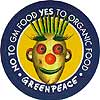








| |


10 Reasons to Eat
Organic Food
Protect Future Generations
Children receive four times the exposure than an adult to at least
eight widely used cancer-causing pesticides in food. The food choice
you make now will impact your child's health in the future.
Prevent Soil Erosion
The Soil Conservation Service estimates that more than three billion
tons of topsoil are eroded from the United States croplands each year.
That means soil is eroding seven times faster than it is built up
naturally. Soil is the foundation of the food chain in organic
farming. But in conventional farming the soil is used more as a medium
for holding plants in a verticle position so they can be chemically
fertilized. As a result, American farms are suffering from the worst
soil erosion in history.
Protect Water Quality
Water makes up two-third of our body mass and covers three-fourths of
the planet. Despite its importance, the Environmental Protection
Agency (EPA), estimates pesticides (some cancer causing) contaminate
the ground water in 38 states, polluting the primary source of
drinking water for more than half the country's population.
Save Energy
American farms have changed drastically in the last three generations,
from the family based small businesses dependent on human energy to
large scale factory farms highly dependent on fossil fuels. Modern
farming uses more petroleum than any other single industry, consuming
12 percent of the country's total energy supply. More energy is now
used to produce synthetic fertilizers than to till, cultivate, and
harvest all the crops in the United States. Organic farming is still
mainly based on labor-intensive practices such as weeding by hand and
using green manures and crop covers rather than synthetic inputs.
Organic produce also tends to travel a shorter distance from the farm
to your plate.
Keep Chemicals Off Your Plate
Many pesticides approved for use by the EPA were registered before
extensive research linking these chemicals to cancer and other
diseases had been established. Now the EPA considers that 60 percent
of all herbicides, 90 percent of all fungicides and 30 percent of all
inscecticides are carcinogenic. A 1987 National Academy of Sciences
report estimated that pesticides might cause an extras 1.4 million
cancer cases among Americans over their lifetimes. The bottom line is
that pesticides are poisons designed to kill living organisms, and can
also be harmful to humans. In addition to cancer, pesticides are
implicated in birth defects, nerve damage and genetic mutation.
Protect Farm Worker's Health
A Natural Cancer Institute study found that farmers exposed to
herbicides had a greater risk, by a factor of six, than non-farmers of
contracting cancer. In California, reported pesticide poisinings among
farm workers have risen an average of 14 percent a year since 1973,
and doubled between 1975 and 1985. Field workers suffer the highest
rates of occupational illness in the state. Farm worker health also is
a serious problem in developing nations, where pesticide use can be
poorly regulated. An estimated 1 million people are poisoned annually
by pesticides. Several of the pesticides banned from use in the
United States are still manufactured here for export to other
countries.
Help Small Farmers
Although more and more large scale farms are making the conversion to
organic practices, most organic farms are small independently owned
and operated family farms of less than 100 acres. It's estimated that
the United States has lost more than 650,000 family farms in the past
decade. And with the US Department of Agriculture predicting that half
of this country's farm production will come from 1 percent of farms by
the year 2000, organic farming could become one of the few hopes left
for family farms.
Support a True Economy
Although organic foods might seem more expensive than conventional
foods, conventional food prices do not reflect hidden cost borne by
taxpayers, including nearly $74 billion in federal subsidies in 1988.
Other hidden costs include pesticide regulation and testing, hazardous
waste disposal and clean up, and environmental damage.
Promote Biodiversity
Mono cropping is the practice of planting large plots of land with the
same crop year after year. While this approach tripled farm production
between 1950 and 1970, the lack of natural diversity of plant life has
left the soil lacking in natural minerals and nutrients. To replace the
nutrients, chemical fertilizers are used, often in increasing amounts.
To Taste Better Flavor
There's a good reason many chef's use organic foods in their recipes.
They taste better. Organic farming starts with the nutrients of the soil
which eventually leads to the nurishment of the plant and ultimately our
palates.
Organic Times, Spring 1992
Excerpted from an article by Sylvia Tawse
Alfalfa's Markets, Boulder, CO
|

Frequently Asked
Questions (FAQs) about organic food.
|
Many folks have questions about what the term organic
means. Back when NOFA first formed, the term "organic"
was defined as good, wholesome, fresh food grown without chemicals or
pesticides. Now, the term "organic" has become a sales
tool, and the definition changes dependant upon who uses it. So,
the federal government thought the term ought to be defined and
published so all those who claim to sell organic products use the same
definition. Here's a brief guide of what "organic" means
today.
1. What is Organic Food?
Organic refers not to the food itself, but to how the
food is produced. Organic food production is based on a system of
farming that maintains and replenishes the fertility of the soil.
Organic foods are produced without the use of synthetic pesticides and
fertilizers. Organic foods are minimally processed to maintain the
integrity of the food without artificial ingrediants, preservatives or
irradiation.
2. How is "Certified Organic" food
different from other organic food?
Certified means that the food has been grown according
to strict uniform standards which are verified by an independent state
or private organization. Certification includes inspections of farm
fields and processing facilities, detailed record keeping and periodic
testing of soil and water to ensure that growers and handlers are
meeting the standards which have been set.
3. Who regulates the certified organic claims?
The federal government set standards for the
production, processing and certification of organic food in the
Organic Food Production Act of 1990. A National Organic Standards
Board was established at that time and now is developing the
guidelines and procedures which will regulate all crops from produce,
grains, meat, dairy, and eggs to processed foods. The U.S. Dept. of
Agriculture oversees the program. Read & comment on
the National Organic Program's Proposed
Organic Rule.
4. Is organic food completely free of pesticide
residues?
Organic food is not produced with toxic, synthetic
pesticides and fertilizers. However, there are some instances where
residues may be carried to organic fields from neighboring
conventional farms and environmental pollution.
5. Do organic farmers ever use pesticides?
Yes. However, only natural pesticides are permitted
with restrictions as a last resort when growers are threatened with
crop failure. Organic farmers' primary strategy is prevention.
By building healthy soils, healthy plants are better able to resist
disease and insects. When pest populations get out of balance, growers
will try various options like insect predators, mating disruption,
traps and barriers. If these fail, permission will be granted by the
certifier to apply botanical pesticides under restricted conditions.
"Botanicals" are derived from plants and are broken down
quickly by oxygen and sunlight.
6. Is organic food better for you?
There is no conclusive evidence at this time to
suggest that organically produced foods are more nutritious. However,
well balanced soils grow strong healthy plants which many believe
taste better and contain more nutrients. Many restaurant chefs across
the country are using organic produce because they think it tastes
better. Organic growers often select varieties to grow for their
flavor, not only their appearance.
7. Why does organic food cost more?
It doesn't really. Prices for organic foods reflects
many of the same costs as conventional foods in terms of growing,
harvesting, transportation and storage. Organically produced foods
must meet stricter regulations governing all these steps so the
process is more labor and management intensive, and organic farming
tends to be on a smaller scale.
There is also mounting evidence that if all the indirect costs of
conventional food production (cleanup of polluted water, replacement
of eroded soils, costs of health care for farmers and their laborers)
were factored into the price of conventionally grown food, the price
for conventionally grown food would be similar to the price for
organic food and would even be higher in some cases.
8. Isn't organic food just a fad?
Not a chance. Sales of organic food totaled $1.4
billion in 1992 and the market has grown an average rate of 25% each
year. The adoption of national standards for certification will open
up many new markets for U.S. organic producers.
Today, approximately 1% of the U.S. food supply is grown using organic
methods. By the year 2000, analysts expect that to reach 10%.
Worldwide, there are now almost 600 organic producer associations in
70 countries. Nations like Japan and Germany are fast becoming
important international organic food markets.
9. Where can I find organic foods?
Organic foods are found at natural food stores, food
cooperatives, health food sections, produce departments and farmer's
markets. There is an increasing variety of organic processed foods
making their way to markets: baby foods, cereals, snacks, cookies,
breads, pastas, juices, peanut butter, herbs and spices, coffee,
yogurt, milk and cheese, soups, and even frozen meals.
- from the National
Organic Farmer's Association of Vermont
|

|










![]()
![]()
![]()

